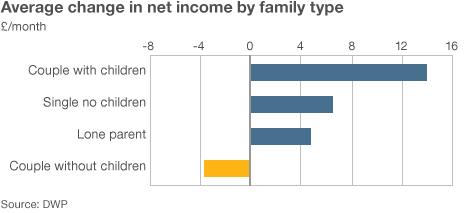Universal credit: Benefits start move to monthly payments
- Published
- comments
Iain Duncan Smith said the slow roll-out of the changes, over four years, was "common sense"
A massive shake-up in the UK benefits system has begun, with the first claims made for new universal credit payments.
Universal credit will merge several benefits and tax credits into one monthly payout.
It begins with a very small number of new claimants in Ashton-under-Lyne in Greater Manchester, but will eventually affect nearly eight million people.
Iain Duncan Smith, the work and pensions secretary, said the new system was about "changing people".
'Right not early'
The benefit is for working age people looking for work, and will replace income-based jobseeker's allowance, income-related employment and support allowance, income support, child tax credit, working tax credit, and housing benefit.
It is the central plank of a benefits overhaul, championed by Mr Duncan Smith, which the government says will mean people are always better off in work than on benefits.
It is also designed to simplify the welfare system by bringing a number of benefits together and reducing fraud and error.
However, some groups have raised concerns that the system is entirely dependent on a complex computer network which may not be ready or able to cope with millions of claims. They are also concerned that many potential claimants do not have access to the internet.
Labour's shadow work and pensions secretary Liam Byrne said that universal credit was "a fine idea that builds on Labour's tax credits revolution".
But he added: "The truth is the scheme is late, over budget, the IT system appears to be falling apart and even DWP [Department of Work and Pensions] ministers admit they haven't got a clue what is going on."
But speaking to the BBC's Today programme, Mr Duncan Smith defended the new system, saying "it's quicker, it's more accurate and it's easier to understand", and said the slow pace of the roll-out was designed to "get it right, not get it early".
Liam Byrne: "This is not the big shake-up we need in the benefits system"
"What we have to do is to start changing people, and that's what this system is about," he said, stressing that paying people on a monthly basis would reflect how the majority of workers are now paid.
"It's about trying to help those who are the most vulnerable to get ready for the world of work, and that will improve their lives dramatically."
Online claims
The key features of universal credit include:
A single, monthly payment which the government says mirrors the world of work, but charities say could create problems for personal money management
The inclusion of financial help to pay rent, which is currently paid directly to landlords
An online-only claiming process, with accounts also managed online
The benefit paid to households, rather than individuals, and put straight into bank accounts
Benefits automatically adjusted depending on earnings, which employers enter into a computer system called real-time information
Claimant Derek O Neill: Twelve months ago I was at rock bottom
This means that there will no longer be a ceiling of 16 hours of work a week, below which people can sign on and above which claims are cancelled.
This is set to benefit people like Darren Bailey, an agency worker, whose working hours fluctuate, meaning he has to keep making claims under the current system.
"I have five kids so I can't afford to mess about," he said. "Any system has got to be better than this system."

Budgeting
The government estimates 3.1 million households will be entitled to more benefits as a result of universal credit, while 2.8 million households will be entitled to less. However, nobody would lose out during the initial transition assuming their circumstances stayed the same, the government said.

All claims for universal credit will need to be made online
Across all households, ministers say there will be an average gain of £16 per month. The long-term cost to the government is £100m in current prices.
The only claimants to receive universal credit in the initial stages will be single, new claimants at a jobcentre in Ashton-under-Lyne.
Three other pilot projects - in Warrington, Oldham, and Wigan - have been delayed until July.
From October, newly unemployed people will make claims under the new system. Current benefits and tax credits will gradually be shifted to universal credit from spring 2014, with the whole process completed by 2017.
Benefits and grants charity Turn2us said that 43% of people whose benefits would be replaced by universal credit were not aware of the change.
"Once you look at the nuts and bolts, budgeting is not going to be easy especially for those with a small amount of money," said Alban Hawksworth, welfare benefits specialist at the charity.